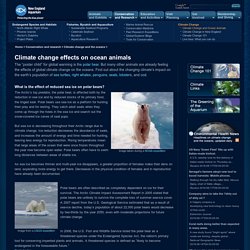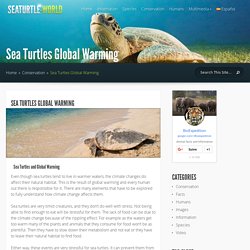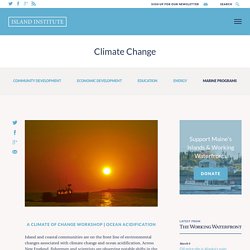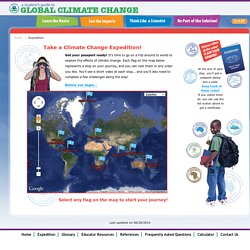

Impact of climate change on whales. Climate change: the effects on ocean animals. The “poster child” for global warming is the polar bear.

But many other animals are already feeling the effects of global climate change on the oceans. Find out about the changing climate's impact on the earth’s population of sea turtles, right whales, penguins, seals, lobsters, and cod. The Arctic’s top predator, the polar bear, is affected both by the reduction in sea ice and by reduced stocks of its primary food, the ringed seal. Polar bears use sea ice as a platform for hunting their prey and for resting. They catch adult seals when they come up through the holes in the sea ice and search out the snow-covered ice caves of seal pups. But sea ice is decreasing throughout their Arctic range due to climate change.
As sea ice becomes thinner and multi-year ice disappears, a greater proportion of females make their dens on land, expending more energy to get there. Polar bears are often described as completely dependent on ice for their survival. In 2008, the U.S. Sea Turtles Global Warming - Sea Turtle Facts and Information. Sea Turtles and Global Warming Even though sea turtles tend to live in warmer waters, the climate changes do affect their natural habitat.

This is the result of global warming and every human out there is responsible for it. There are many elements that have to be explored to fully understand how climate change affects them. Sea turtles are very timid creatures, and they don’t do well with stress. Not being able to find enough to eat will be stressful for them. Either way, these events are very stressful for sea turtles. At the same time the larger sea turtles will become a common food supply for both sharks and whales. Species threatened by climate change. NASA's Climate Kids- (SOLUTIONS) ARKive - (good for research)
Wildscreen's Arkive project was launched in 2003 and grew to become the world's biggest encyclopaedia of life on Earth. With the help of over 7,000 of the world’s best wildlife filmmakers and photographers, conservationists and scientists, Arkive.org featured multi-media fact-files for more than 16,000 endangered species. Freely accessible to everyone, over half a million people every month, from over 200 countries, used Arkive to learn and discover the wonders of the natural world. Since 2013 Wildscreen was unable to raise sufficient funds from trusts, foundations, corporates and individual donors to support the year-round costs of keeping Arkive online. Therefore, the charity had been using its reserves to keep the project online and was unable to fund any dedicated staff to maintain Arkive, let alone future-proof it, for over half a decade. Despite appeals for support, just 85 of our 5.6 million users in 2018 made a donation.
Island Institute (Ocean Acidification) A Climate of Change Workshop | Ocean Acidification Island and coastal communities are on the front line of environmental changes associated with climate change and ocean acidification.

Across New England, fishermen and scientists are observing notable shifts in the ecosystem and dramatic changes in the number of fish in the water. Years of harvesting pressure paired with the effects of warming waters and an ever-changing ocean ecosystem have led to the crisis we currently face in the groundfish fishery. Other fisheries such as lobster and shrimp are also grappling with shifting environmental conditions.
Scientists, managers, and fishermen have all begun to discuss how we can and should be planning for the unpredictable, impacts these shifts will have on the marine environment and the communities that depend on the ocean resources. We do this by: A Student's Guide to Global Climate Change.
Penguins. Polar Bears. A Student's Guide to Global Climate Change. Get your passport ready!

It's time to go on a trip around to world to explore the effects of climate change. Each flag on the map below represents a stop on your journey, and you can visit them in any order you like. You'll see a short video at each stop... and you'll also need to complete a few challenges along the way! Accessible version for screen reader user Before you begin... (<a href="expedition-popup-alt.html">Alternative version</a>) <a href="expeditions-508.html">Accessible version of all the expeditions</a> Map Data Imagery ©2015 NASA Satellite Map Select any flag on the map to start your journey! At the end of each stop, you'll get a passport stamp and a code.
How Does this Expedition Work? At each stop on your journey, you'll see a 5– to 10–minute video. Depending on your Internet connection speed, the video might pause occasionally to allow the rest of the file to download. Each video will pause a few times to ask you a question. Enter your codes on the tracking sheet. Climate change: the effects on ocean animals. Global Warming Effects Map - Effects of Global Warming. Impacts & Adaptation. Climate Change Impacts & Threats.